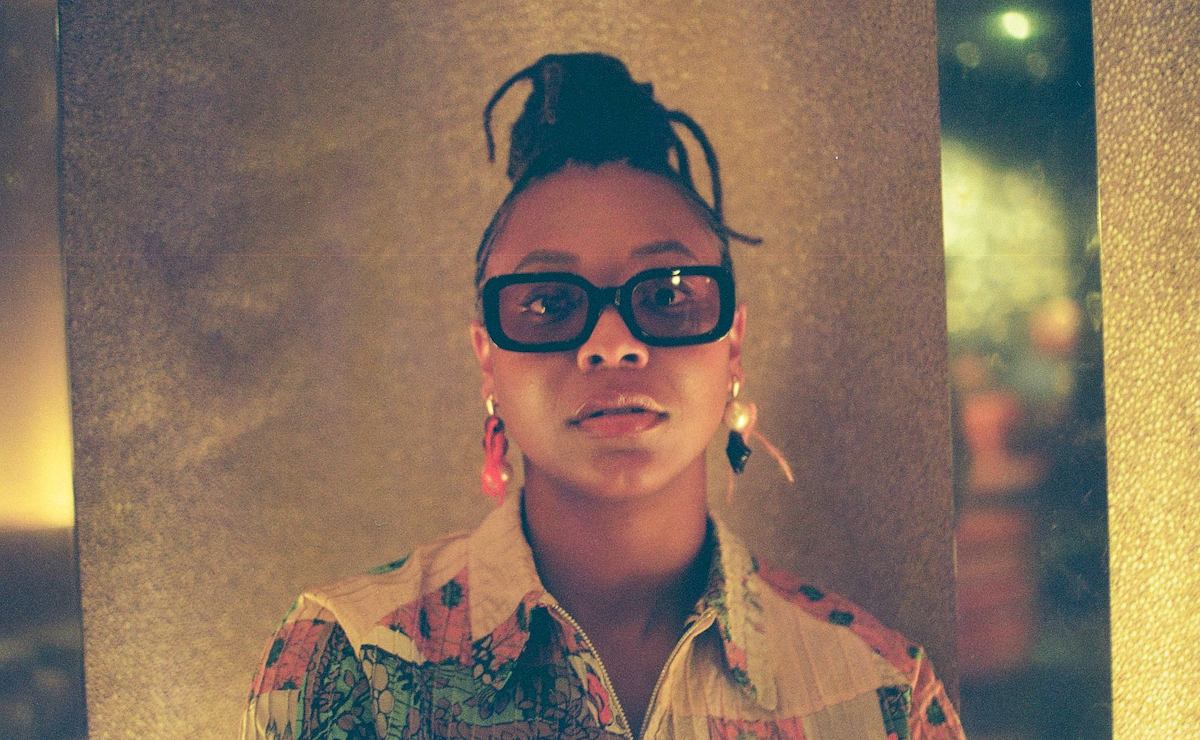
In this exclusive interview, GRAMMY-winning R&B artist Rae Khalil sits down with us to discuss her creative journey and future musical direction. Known for blending genres and breaking boundaries, Rae shares her approach to music creation—following what feels right and staying true to her artistry. She opens up about making her sophomore album Crybaby, embracing vulnerability and the depth behind its sound. Discover how she plans to continue exploring different genres in her upcoming projects and why authenticity remains at the heart of her work.
Stream Unpopular Demand On:
Spotify
Apple Podcasts
YouTube
Ethan Ijumba: So, going into this right now, your recent album, CRYBABY, has a lot of different themes and elements, and it's based on a lot of experiences from your own as well as others' perspectives. It's a very well-thought, in-depth album that you've got going on for yourself to come off with this. With that being said, were there any direct influences or inspirations that you've got from this album specifically? Because we see you play around with a lot of different genres and styles from New Age soul, a little bit of pop in there, some raps that you showcase that you've got verses in there as well. Was anything direct or indirect that influenced this album for what it became?
Rae Khalil: I think it’s kind of the opposite. Like you said, I wanted to tap into as many of the different multifaceted layers of R&B as possible and explore them. What are the different subgenres that I could explore? There was no album or anything that inspired the project. It was more so I wanted to showcase different varieties of styles of R&B that I could do. I think it turned out really fun.
EI: Going along with that, you're already so multi-talented at what you do, like how you produce, make verses, rap, sing everything in the whole nine yards, and can dabble with instruments. Do you ever have a clear direction when you make these kinds of projects, or do you tend to let everything sit in at the time and let the moment come to you and go off there? Or is there any specific method or strategy that you have in creating music?
RK: I think the only strategy I would say is if it feels good, keep working on it. Then there's this weird transition from feeling good to feeling right. Nothing's ever right cause it's subjective, but when it feels right, then you can’t let it go. But I think the fun part about making music is that excitement and exploration, discovering what feels right and feels good.
EI: For this album, you said you were trying to be as vulnerable as possible. You wanted to show the depth, layers, feelings, and emotions and wanted people to see that for once. With that being said, was there anything cathartic for you to actually show for yourself, allowing yourself to be vulnerable? Was this something new that you didn't let yourself do before? Or was it just something you wanted to try differently and experiment with? What was the process with that?
RK: That’s a good question; I feel like it probably felt cathartic towards the end of the project, but while making it, I just felt like I was just so present, and then kind of piggybacking off the last question, I just wanted to make music that felt good to me, Something that I was proud of and I could stand on as being my first major label type of song.
EI: Did you feel pressured or hesitant when making this record? Or did you have any mixed feelings or just overall unsettledness, or did you have a 100% feeling that this is the one I feel is perfect as soon as it's mixed, mastered, engineered, etc? How does it feel with this being the album that everyone's gonna take in to understand this is who you are as an artist?
RK: You know, that's such a funny question. Those types of feelings come later, and I don't know if other artists feel this way, but for me, when I'm making the music, I have the utmost confidence in myself and the songs, and it's enjoyable and fun. But I think when you get to a point where it now goes into the world because I don't speak for everyone, I don't know everyone's experience, you don't really know how it's gonna resonate. Like I can say, I'm such a music listener, and I have such an eclectic taste of music, but still, you don't really know what's gonna hit everyone. So I think there's like an anxiety that comes with that, and I think I'm experiencing that right now. Like, are people gonna listen? Not really if they like it or not, more so if they listen to it and understand it. I think that those types of things come once you have a little bit less control over them, and you now know it's in the world.
EI: Do you enjoy the aspect of being in the studio, having control about how it's going to sound, and just working on the process of everything and the composition aspect of it more than it comes down to just the promotional, the touring, and the overall just anything that it comes down to it. Now, giving it to those to take it in because you're at the point where critics can say and not even say it's for audiences and such and such.
RK: I don't think it's to that degree. I think there are levels to all these feelings, but I do think that I shine best in writing songs and performing them. Everything else is still a work in progress, whether that's how long it takes to write work in a studio or understand the mixing and mastering aspect. Even the business side of things, organizing and constructing a tour, putting together those types of things, and analytics when it comes to social media. A lot of things go into this job, but I feel like my strong suit definitely comes with making the songs in terms of the writing aspect and the performing of the songs. Everything else, it doesn't scare me. I come with open arms, but at the same time, we all have our strong suits and the things that we like more than the other.
EI: Of course, everyone's got their heaven and their hells. It's just which one you're going to be in today or which one you might be in tomorrow. But either way, you can get through both overall.
EI: To speak further about the album that you've got going on with CRYBABY, what was it like working with these different artists now and different creative dynamics? You've got someone who goes bar for bar, like Freddie Gibbs. You've got someone who can do it both ways with Anderson .Paak. You've got Zacari, who's always known for his vocals from what he's done with TDE, and Benny Sings as well, who is a great instrumentalist. How was it working with these different people from different places, paths, avenues, and walks of life into this album?
RK: Man, it was wonderful. I feel extremely grateful, and I have extreme levels of gratitude for all the artists who wanted to participate. Man, especially with the likes of Freddie Gibbs and Anderson .Paak and Benny Sings those guys are veterans in the game. Zacari, as well; just to have people who have been doing it at a high level on my album is such a blessing. I mean, even to work with someone so young in their career, just the sky's the limit. A young artist named Khalil, you know, he's super talented, Tiana Major9, it's really an honor, and it's awesome to be able to work with people on your level and people that are different levels. So I felt like I have all levels of artists on my album, people that I aspire to be career-wise, people that I feel like are peers, and then people that I feel like are developing. I think it's just an album for music nerds, the lovers of music with care.
EI: At this point in your career, do you have a specific idea of what you want to do for the next one already? Or are you still kind of letting this one settle in because it still feels surreal about where you're at at this point in your life?
RK: I have ideas already.
EI: Does it always feel like it's still flowing and flowing as you're just always putting pen to paper?
RK: Yeah, it's just the natural evolution of how I work and how I've gotten this far. If there's a perpetual, consistent feeling of what's next, I just feel like that's how great people continue to be great. It's like you live in the moment for a little while, and then you move on. What's my next challenge? So right now, I'm in that space where I'm living in this album, and I'm excited to tour it. But I'm also living right now in the present, absorbing a lot and getting inspired again. So, the writing is constant, and brainstorming and imagining projects and stuff will also be constant. But I think I'm always open to change and scrapping.
EI: Yeah, of course. You can't just have a one-track mind. You have to revise here and there and take things constantly.
RK: It's just a never-ending game, but it's fun to see the beauty in it. When you see it like, wow, if I never did that, I wouldn't have found this, or I never would have created this instead. I feel like that's pretty much what CRYBABY represents to me: the perseverance of having an idea, seeing it through, keeping the concepts, but being open and willing to change songs. If I weren't willing, I wouldn't have liked most of these songs on this project. So it's a give and take of both.
EI: Then, from what we can see from you coming forward if you can't reveal too much, then we can completely understand because that's just how it is. But when it comes down to what you've got planned or the ideas you have. Would you want what you have coming forward to be in a similar mold of how you wanna go about things? Do you wanna consistently have different R&B elements shown? Do you wanna maybe have an album that's more focused on strictly rap instead? Or would you rather keep it to where everyone's just gonna have to wonder and have their expectations just blind at this point in this career?
RK: That's a good question. I think right now, my main focus is on showing people what I can do in life. I have some live performances on social media and other outlets that showcase my live vocals. My focus right now is going to be like getting, packing out rooms, and making people be like, damn. I want to be like, now we're going to do a rock album and then now we're going to do techno. I'm not going to, and I'm not going to feed people breadcrumbs. I'm just going to do it. So, right now, my focus is live music. It is bothering me that people are like, damn, does she rap anymore? I'm like, no. I will say to that that is this: I don't think you'll see something like a four-year hiatus like that from me for a very long time. The releasing music is gonna be a little bit more consistent, and I think with the success of this project, depending on how that does, I'll have a little bit more creative freedom to be like, what can I put out? Not to say I don't, I'm just saying, with time, I'll be able to indicate, this is what's my next move, you know?
EI: Agreed. Honestly, keeping it that way helps you as an artist. It also helps the audiences have higher expectations but also a little bit more realistic expectations, to be like, okay, whatever we get next, we're going to enjoy it. It's better to do it that way than just say what you can expect. Then, next time we get it, someone might be like, "This isn't what I wanted."
RK: I don't know if my label might not like this, but I feel like I'm a very you-get-what-you-get type of artist. Even though I did want to do an R&B album, I feel like people would gravitate more to my singing as a debut. So I do compromise? But at the same time, this is what we're doing, and we're doing it.
EI: To your point, and no diss to your label, but sometimes the artist knows better. Sometimes by taking those risks and those opportunities that you might be against and butt heads here and there. But, like you said, a fair compromise is always the best way to go about it. But sometimes you're 100 % in the right, and you just take the risk, and next thing you know, you blow up; they can't really tell you anything after that. Nonetheless, I think it's better to showcase all of your talents for your major label debut because imagine if we got, I'm making a Kendrick comparison again, but I think if we got To Pimp A Butterfly first before good kid, m.A.A.d city or Section.80, I think it wouldn't make much sense since there's a method behind the madness.
RK: And who's to say he didn't have To Pimp A Butterfly demos during the good kid, m.A.A.d city times if the idea was sparked in a different moment, and through time it was brought to life. So I think that's when the best art is like a mixture of time spent on the idea, and I also think of the spontaneity of riding that wave between the two.
EI: And it's hard to find the mix of it because if you're thinking a little bit too much in the present, then it's hard to think about a master plan of, like, here's how we're planning out the next two years if not even two months, let alone two days which it's good to do, but sometimes it is a little bit hard to find common ground about how do we go about this the best way, and it comes with mistakes, and it comes with wins, but nonetheless like you're gonna come out okay at the end if not better so it's just part of that. So it's just nothing but flowers to give for what you've got for your debut.
RK: Man, thanks so much!
EI: Of course!












